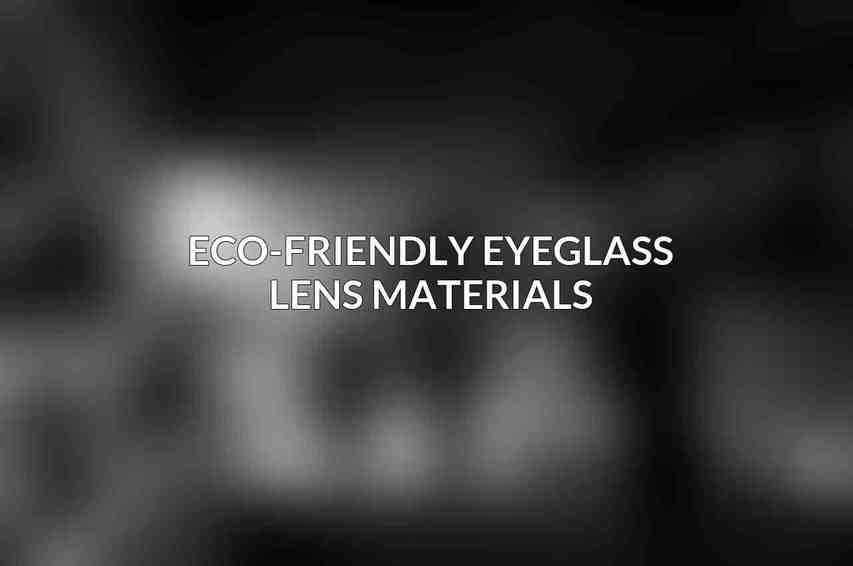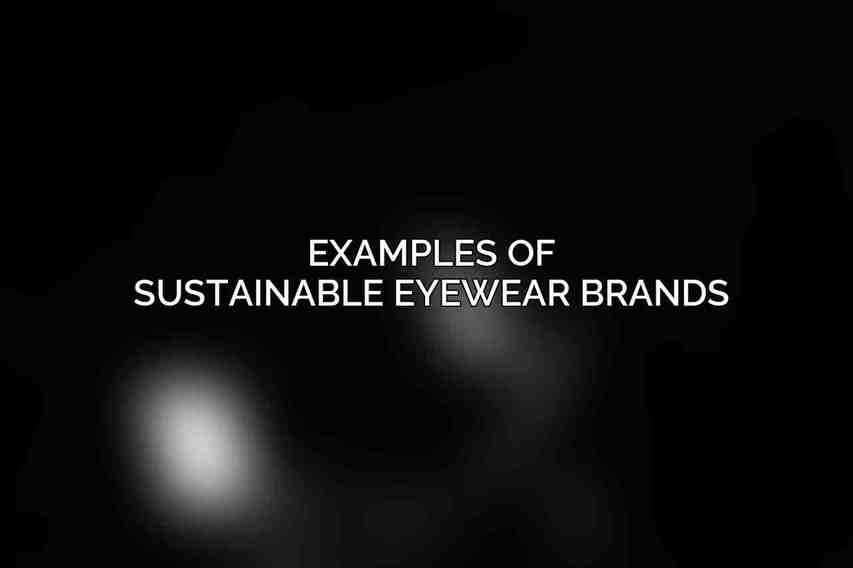When it comes to eyewear production, sustainability has become a crucial aspect that cannot be ignored in the modern world. The eyewear industry, like many others, is increasingly recognizing the importance of incorporating eco-friendly practices into its manufacturing processes. The shift towards eco-friendly eyewear is driven by the growing awareness of environmental issues and the need to mitigate the impact of traditional manufacturing methods.
Traditional eyewear materials, such as plastic and metal alloys, have raised environmental concerns due to their non-biodegradable nature and the carbon footprint associated with their production. The disposal of old eyeglass frames made from these materials contributes to landfill waste and pollution. As a result, there is a pressing need to explore sustainable alternatives that can help reduce the environmental impact of eyewear production.
Definition and benefits of eco-friendly eyewear materials:Eco-friendly eyewear materials are those that are sourced, produced, and disposed of in a sustainable and environmentally conscious manner. These materials offer several benefits, including being renewable, biodegradable, recyclable, and non-toxic. By switching to eco-friendly materials, eyewear companies can minimize their ecological footprint and contribute to a cleaner, greener planet.
| Product | Material | Eco-Friendly Features | |||||||||||||||||||||||||||||||||||||||||||||||||||||||||||||||||||||||||||||||||||||||||||||||||
|---|---|---|---|---|---|---|---|---|---|---|---|---|---|---|---|---|---|---|---|---|---|---|---|---|---|---|---|---|---|---|---|---|---|---|---|---|---|---|---|---|---|---|---|---|---|---|---|---|---|---|---|---|---|---|---|---|---|---|---|---|---|---|---|---|---|---|---|---|---|---|---|---|---|---|---|---|---|---|---|---|---|---|---|---|---|---|---|---|---|---|---|---|---|---|---|---|---|---|---|
| Warby Parker Durand Blue Light Glasses | Acetate | Made from plant-based cellulose | |||||||||||||||||||||||||||||||||||||||||||||||||||||||||||||||||||||||||||||||||||||||||||||||||
| Ray-Ban Wayfarer Liteforce | Carbon fiber | Lightweight and durable, made from recycled carbon fibers | |||||||||||||||||||||||||||||||||||||||||||||||||||||||||||||||||||||||||||||||||||||||||||||||||
| Oliver Peoples Cary Grant | Titanium | Hypoallergenic and corrosion-resistant | |||||||||||||||||||||||||||||||||||||||||||||||||||||||||||||||||||||||||||||||||||||||||||||||||
| Maui Jim Makaha | Nylon | Lightweight and flexible, made from recycled plastic bottles | |||||||||||||||||||||||||||||||||||||||||||||||||||||||||||||||||||||||||||||||||||||||||||||||||
| Costa Del Mar Fantail | Monel | Corrosion-resistant and hypoallergenic, made from recycled metal | |||||||||||||||||||||||||||||||||||||||||||||||||||||||||||||||||||||||||||||||||||||||||||||||||
| Visit Eyeglasses.com | |||||||||||||||||||||||||||||||||||||||||||||||||||||||||||||||||||||||||||||||||||||||||||||||||||
Eco-Friendly Eyeglass Frame Materials
A. Acetate (Plant-based, Biodegradable)
Acetate is a popular choice for eco-friendly eyeglass frames as it is derived from plant cellulose, typically obtained from cotton. This material is renewable, biodegradable, and hypoallergenic, making it an excellent option for those looking for sustainable eyewear.
| Pros of Acetate | |
|---|---|
| Derived from plant cellulose | Renewable |
| Biodegradable | Hypoallergenic |
B. Bamboo (Renewable, Durable)
Bamboo is another sustainable option for eyeglass frames. It grows quickly and sustainably, making it a renewable resource. Bamboo frames are exceptionally durable, lightweight, and have a unique aesthetic appeal.
| Advantages of Bamboo Frames | |
|---|---|
| Grown sustainably | Lightweight |
| Durable | Unique aesthetic appeal |
C. Recycled Aluminum (Recyclable, Lightweight)
Frames made from recycled aluminum are gaining popularity in the eco-friendly eyewear market. This material is produced from recycled aluminum scrap, making it a sustainable choice. Recycled aluminum frames are durable, lightweight, and often more affordable than traditional options.
| Recycled Aluminum Frames | |
|---|---|
| Made from recycled aluminum scrap | Durable |
| Lightweight | Inexpensive |
D. TR90 (Thermoplastic, Flexible)
TR90 is a high-grade thermoplastic material used for eyeglass frames that offer flexibility, impact resistance, and chemical resistance. This material is lightweight and durable, making it suitable for active individuals seeking eco-friendly eyewear options.
| Features of TR90 Frames | |
|---|---|
| High-grade thermoplastic | Flexible |
| Impact-resistant | Chemical-resistant |
E. Wood (Sustainable, Renewable)
Wood frames are a classic and sustainable choice for eco-friendly eyeglasses. Sourced from sustainable forests, wooden frames are natural, renewable, and offer a unique aesthetic appeal. Each pair of wood frames is distinct due to the natural variations in wood grain.
| Advantages of Wood Frames | |
|---|---|
| Sourced from sustainable forests | Renewable |
| Natural appeal | Unique aesthetic appeal |
Eco-Friendly Eyeglass Lens Materials

A. CR-39 (Polycarbonate, Impact-resistant)
CR-39 lenses are made from a type of polycarbonate that is durable, impact-resistant, and lightweight. These lenses are widely used in eyewear for their reliability and safety features. CR-39 lenses are also recyclable in some communities, adding to their eco-friendly credentials.
| CR-39 Lens Characteristics | |
|---|---|
| Durable | Impact-resistant |
| Lightweight | Recyclable in some communities |
B. Glass (Natural, Recyclable)
Glass lenses are a traditional option for eyewear that is made from natural raw materials. Glass lenses are recyclable, scratch-resistant, and offer excellent optical clarity. While not as impact-resistant as some other materials, glass remains a sustainable choice for lens material.
| Benefits of Glass Lenses | |
|---|---|
| Made from natural raw materials | Recyclable |
| Scratch-resistant | Offers optical clarity |
C. Bio-Based Lenses (Plant-derived, Renewable)
Bio-based lenses are made from plant-derived renewable resources, offering a sustainable alternative to traditional lens materials. These lenses are biodegradable and environmentally friendly, appealing to eco-conscious consumers looking for greener eyewear options.
| Bio-Based Lens Advantages | |
|---|---|
| Plant-derived renewable resources | Biodegradable |
| Environmentally friendly | Sustainable choice |
D. Mineral Glass Lenses (Recyclable, Scratch-resistant)
Mineral glass lenses are made from natural minerals and offer superior scratch resistance and impact resistance. These lenses are also recyclable, making them a sustainable option for those looking for durable and eco-friendly eyewear.
| Characteristics of Mineral Glass Lenses | |
|---|---|
| Made from natural minerals | Recyclable |
| Scratch-resistant | Impact-resistant |
Examples of Sustainable Eyewear Brands

A. Eyeglasses.com
Eyeglasses.com offers a wide range of eco-friendly eyewear options to cater to environmentally conscious consumers. The brand utilizes sustainable materials such as acetate, bamboo, and recycled aluminum in its eyewear frames, aligning with the growing demand for eco-friendly eyewear choices.
| Features of Eyeglasses.com | |
|---|---|
| Wide range of eco-friendly options | Sustainable materials |
| Focus on environmental responsibility | Diverse frame selections |
B. Warby Parker
Warby Parker is renowned for its sustainable practices and commitment to using eco-friendly materials in its eyewear. The brand offers frames made from bamboo, acetate, and recycled plastic, appealing to consumers seeking stylish and sustainable eyewear solutions.
| Warby Parker’s Sustainability Initiatives | |
|---|---|
| Use of eco-friendly materials | Stylish designs |
| Commitment to sustainability | Wide selection of frames |
C. Shwood
Shwood specializes in wooden sunglasses made from sustainably sourced wood, showcasing the beauty and durability of natural materials. The brand’s wooden frames feature unique patterns and textures, providing a distinctive and environmentally friendly eyewear option.
| Shwood’s Emphasis on Sustainability | |
|---|---|
| Wooden sunglasses made from sustainable wood | Unique patterns and textures |
| Eco-friendly design approach | Focus on quality craftsmanship |
D. Modo
Modo is a brand that offers eyewear made from recycled plastic, bamboo, and other plant-based materials, reflecting its commitment to ethical production and environmental responsibility. The brand’s frames combine style, sustainability, and innovation to create a contemporary eyewear experience.
| Modo’s Sustainable Eyewear Offerings | |
|---|---|
| Use of recycled plastic and plant-based materials | Ethical production practices |
| Focus on innovation and sustainability | Stylish and eco-friendly designs |
Benefits of Choosing Sustainable Eyewear
Opting for sustainable eyewear has numerous advantages beyond just reducing environmental impact. Eco-friendly materials offer a range of benefits that appeal to consumers looking for both style and sustainability in their eyewear choices.
Benefits of Choosing Sustainable Eyewear:– Environmental protection: Reduces the ecological footprint of eyewear production and consumption.- Health benefits: Hypoallergenic materials minimize skin irritation and allergies, promoting eye health.- Durability: Some sustainable materials offer superior durability, extending the lifespan of eyewear and reducing the need for frequent replacements.- Style and aesthetics: Eco-friendly materials provide a wide range of stylish designs, allowing individuals to express their fashion sense while supporting sustainable practices.- Ethical choice: By choosing sustainable eyewear, consumers support responsible consumption and contribute to a more sustainable future.
the shift towards eco-friendly materials in eyewear production is not only a trend but a necessity in this environmentally conscious world. By opting for sustainable eyewear options that leverage materials like acetate, bamboo, recycled aluminum, and bio-based lenses, individuals can make a positive impact on the environment while enjoying stylish and durable eyewear. Sustainable eyewear brands like Eyeglasses.com, Warby Parker, Shwood, and Modo are leading the way in offering eco-friendly choices for conscientious consumers who prioritize both style and sustainability.
Frequently Asked Questions
What are some eco-friendly materials commonly used in eyewear production?
Some eco-friendly materials commonly used in eyewear production include recycled plastics, bio-based plastics, wood, bamboo, and cork.
How do eco-friendly materials in eyewear production help the environment?
Eco-friendly materials in eyewear production help reduce the reliance on traditional plastics, which are harmful to the environment. They also promote sustainability by utilizing renewable resources.
Are eyewear products made from eco-friendly materials durable?
Yes, eyewear products made from eco-friendly materials are designed to be as durable as those made from traditional materials. Sustainable eyewear brands prioritize both durability and environmental responsibility.
Can I find stylish designs in eyewear made from eco-friendly materials?
Yes, many sustainable eyewear brands offer a wide range of stylish and fashionable designs made from eco-friendly materials, catering to different tastes and preferences.
How can I dispose of eyewear made from eco-friendly materials at the end of its lifespan?
When disposing of eyewear made from eco-friendly materials, look for recycling programs or options in your community. Some brands also offer take-back programs to properly recycle or reuse old eyewear.

